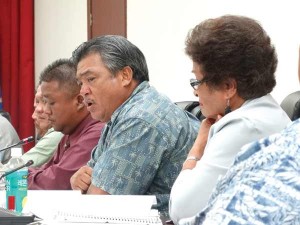$145M budget heads to Inos
Rep. Tony Sablan and other lawmakers who led fiscal year budget talks explained the points of their bicameral compromise budget bill yesterday before it was voted and passed by the House. (Dennis B. Chan)
A $145-million budget bill for next fiscal year has left the Legislature and now awaits the vetting of the Executive Branch before the hopeful signature of Gov. Eloy S. Inos to make the bill law and avoid a government shutdown next week.
“Even if the Legislature passes the budget, I just can’t rubber stamp it,” said Inos in an interview yesterday morning, before the House and Senate held separate sessions to pass the bill.

The House adopted the bill yesterday with 18 “yes” votes against two “no” votes. The Senate adopted it unanimously, with all nine members voting yes.
Inos has until next Wednesday, Sept. 30, the close of the fiscal year, to sign the budget into law.
Yesterday, the Executive Branch—including the Office of Management and Budget, the special assistant for administration, and the Office of the Attorney General—began examining the compromise budget bill.
The House and Senate had been in a deadlock for most of the three weeks since budget talks began on Sept. 3 but emerged from a session on Tuesday with a compromise.
Inos, though, could veto the bill, but Senate President Victor Hocog (Ind-Rota) said he does not think the governor will do so.
“I do not see the governor veto[ing] the budget because there is too much at stake,” said Hocog after senators approved the compromise bill. He noted payments to the settlement trust, the Retirement Fund, and the 25 percent allocation of general funds for the Public School System.
Still, some red flags have been raised. Concerns that were brought up in a Cabinet meeting on Tuesday remain part of the proposed budget. For one, administration officials that did a preliminary review of the budget think the Legislature’s 5-percent salary increase for law enforcement personnel appears to be not clearly funded, and would force departments to pull from existing funds to support the increase.
There’s also a concern that benefits outlined for some Commonwealth Healthcare Corp. employees aren’t funded.
The three members representing the House on the conference committee were grilled over a compromise $300,000 leadership account that the Senate had wanted, and got. The House was proposing a $179,387 account. The Senate pushed for, and got, a 67-percent increase.
“When you hear terms like ‘this is a complete package,’ you know you have some difficulty ahead of you,” said Rep. Antonio Sablan (Ind-Saipan), who led the budget talks as conference chairman.
Sablan was speaking to some of the concerns from members from the House minority over compromises in the budget.
“Our backs were up against the wall,” said Rep. Angel Demapan (R-Saipan), a budget conferee.
Demapan said the “bottom line was avoid a government shutdown” and “safeguarding the livelihood of our people.”
“We had to make the decision,” Demapan said, urging House representatives to no longer delay the passage of the budget bill. He said the $145 million budget was a “projection we have to help the government realize…and help exceed.”
The main tussle with the budget talks were the allocation of Marianas Visitors Authority earmarks amounting to about $2.5 million. The Senate’s original proposal to use some Inos-directed earmarks drew the ire of Inos, who earlier told reporters this was an invasion of MVA funds.
When asked if he still thought this way, Inos said it depends on how they “cut it.”
Right now, the Senate and House have agreed to “modify” MVA’s programs budget via their legislative authority, rather than amending earmarks in the Senate’s first proposal.
“So the funds remain in the MVA earmarked account,” Inos said. “They are just instructing that MVA fund certain projects with the MVA budget and not by taking money away and not replenishing it, or reducing the earmark. I think it’s more of a legal issue. I defer to the AG’s office.”
MVA managing director Perry Tenorio and MVA chair Marian Aldan Pierce and two other board members met with Inos yesterday morning to air their concerns.





A budget that isn’t! So why all the lamed accolades?
I am wondering if the AG will find anything that is against the constitution?
It looks like these Senators were dragging this out to the last minute in attempt to ‘force’ Inos signature to keep from a shutdown.
BUT in the case of a shut down, ALL of the people know it is the elected faults and not the Gov. as this assembly of fuuls have had the submitted budget for 6 months already and wait until the end to make questionable changes.
When you impose an increase without the funds isn’t that in fact a defunding? Mandating MVA how its earmarked funds are spent would be illegal or unconstitutional for it is already legally funded. It’s a package that had me wowing all the way to the rest for tissue!
Angel you are so full of it. You guys want the governor to sign off the budget so that you all can get the HUGE increase of discretionary fund. we the people are smarter than you. we can read in between the lines. You are all forcing the ‘shut down’ issue as a distraction for the people. CNMI are you all for the legislature to get the HUGE Discretionary Fund increase? Yes or No.
Shut it down Govna’! No increases to no one until CNMI fully recovered from Soudelor: PERIOD! SHAME ON HOUSE AND SENATE!